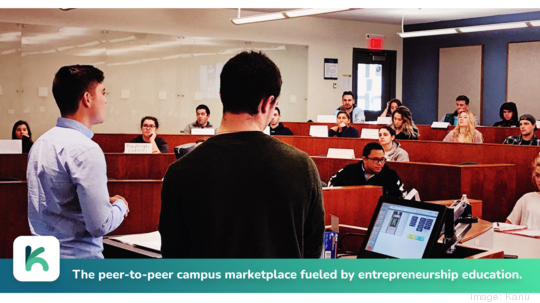
Three years ago, Kanu co-founders Ben Grossman and Andrew Bikash launched their app, which allows students to create and scale their own small business. Now, the University of Rhode Island is just one of several schools nationwide using Kanu’s platform.
Kanu’s app is a student-to-student marketplace for products and services. The company says students can use it to earn money on innovative ideas or products, and educators can use it to supplement business curriculum with real-world entrepreneurial experience. Grossman and Bikash started the company in 2019 while students at URI.
While the co-founders said they didn’t envision Kanu growing into a teaching application, they’ve embraced their jump into the world of education. Recently, the company was awarded first place at the United States Association for Small Business and Entrepreneurship’s entrepreneurship experiential education competition. The award went to the most innovative, impactful and valuable experiential exercises for entrepreneurship classrooms.
Kanu has helped URI students launch a laundry service, gas-delivery service and various tutor services in what the pair call a “campus economy.”
Grossman and Bikash were also named to Rhode Island Inno’s Inno Under 25 list and were recipients of the Inno on Fire award in 2020.
Nancy Forster-Holt, an assistant professor of entrepreneurship at URI, said Kanu solves a problem she struggled with for years.
“I could not figure out how to require the development and launch of a real business for classes of up to 75 students. There was no safe, one-stop platform where I could keep an eye on all the students’ work,” she said. “Kanu is available to the entire campus, but it also provides an educator with an organizing tool for the multiple student side hustles within a classroom setting.”
For security purposes, the platform is geo-fenced for each campus and requires proper .edu credentials for participation.
Forster-Holt said the app makes it easy for students to set up a storefront, but the real work begins afterward, when the students receive real market feedback and need to make decisions about how to turn their idea into a business.

Among other course assessments, students work through various business-building exercises on Kanu. Their progress is measured via “badges” that guide the students through exercises, serve as a visual connection to course content and act as a barometer of proficiency, Forster-Holt said.
Along the way, students complete tasks and get feedback while building peer-to-peer business activity that aligns with their academic work.
“I call it ‘stimulation’ versus a simulation. The experience is real, and students get the entrepreneurial butterflies that they would not experience if the project was hypothetical, as it used to be before Kanu,” she said. “The best ideas for side hustles come from skills that one’s friends and acquaintances already seek out.”
As Grossman and Bikash continue to partner with educators on campuses like Drexel University in Pennsylvania and URI, they said they want to build on their already established connections to continue their growth.
“This year is a big one for us,” Bikash said. “We see it as a growth year and we’re hard at work to expand our user base and expand the platform into different schools.”
Currently the platform is used in 17 classrooms, Bikash said, and it’s helped students create more than 1,000 startups on campus. Some of the memorable businesses to sprout via the app, Bikash said, were an app that scheduled CVS prescriptions for delivery to campus and another that provided tools for sneaker resellers.
“It’s been very cool to see businesses thrive and be able to scale, but the educational value is something we didn’t fully realize,” Grossman said. “We’ve always been passionate about that part but last year we really started to understand we needed to partner with educators and that’s naturally happened. Our goal has always been to empower and educate and we’re just pushing that forward.”








